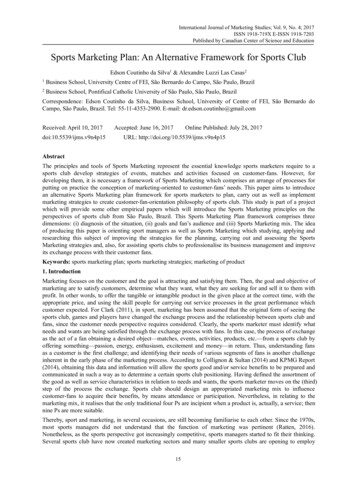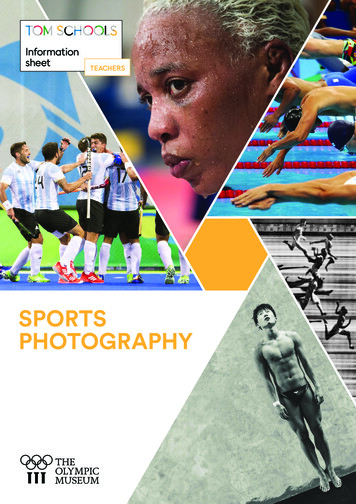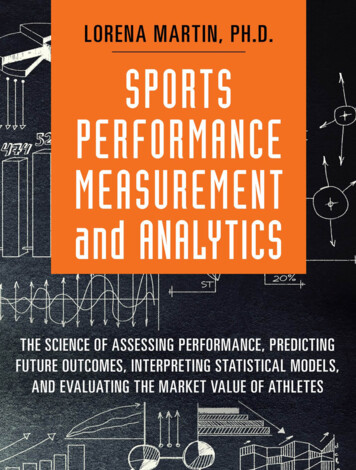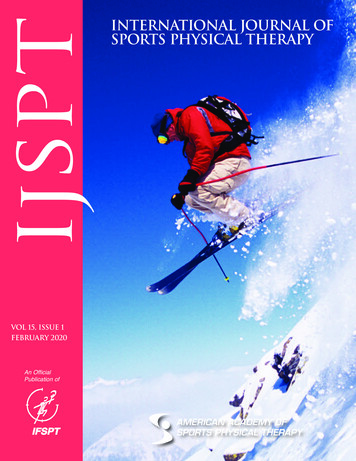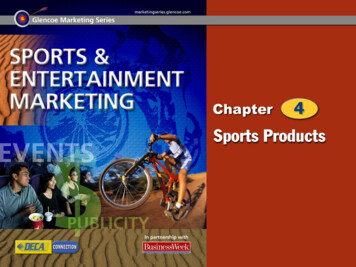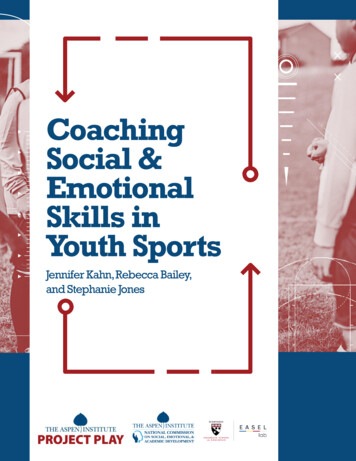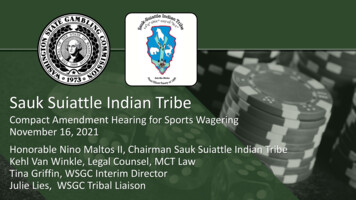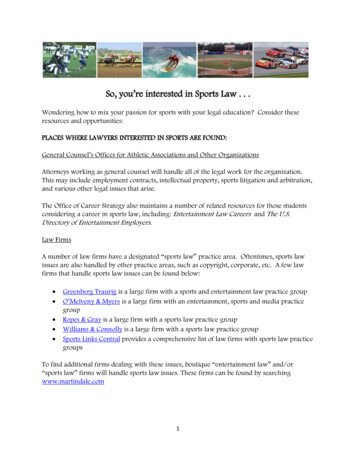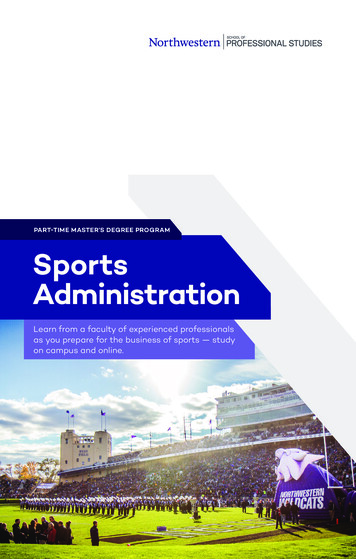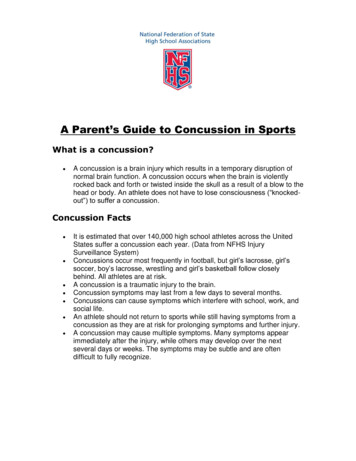
Transcription
A Parent’s Guide to Concussion in SportsWhat is a concussion? A concussion is a brain injury which results in a temporary disruption ofnormal brain function. A concussion occurs when the brain is violentlyrocked back and forth or twisted inside the skull as a result of a blow to thehead or body. An athlete does not have to lose consciousness (“knockedout”) to suffer a concussion.Concussion Facts It is estimated that over 140,000 high school athletes across the UnitedStates suffer a concussion each year. (Data from NFHS InjurySurveillance System)Concussions occur most frequently in football, but girl’s lacrosse, girl’ssoccer, boy’s lacrosse, wrestling and girl’s basketball follow closelybehind. All athletes are at risk.A concussion is a traumatic injury to the brain.Concussion symptoms may last from a few days to several months.Concussions can cause symptoms which interfere with school, work, andsocial life.An athlete should not return to sports while still having symptoms from aconcussion as they are at risk for prolonging symptoms and further injury.A concussion may cause multiple symptoms. Many symptoms appearimmediately after the injury, while others may develop over the nextseveral days or weeks. The symptoms may be subtle and are oftendifficult to fully recognize.
What are the signs and symptoms of a concussion?SIGNS OBSERVED BY PARENTS,FRIENDS, TEACHERS OR COACHESSYMPTOMS REPORTEDBY ATHLETEAppears dazed or stunnedHeadacheIs confused about what to doNauseaForgets playsBalance problems ordizzinessIs unsure of game, score, or opponentDouble or fuzzy visionMoves clumsilySensitivity to light or noiseAnswers questions slowlyFeeling sluggishLoses consciousnessFeeling foggy or groggyShows behavior or personality changesConcentration or memoryproblemsCan’t recall events prior to hitCan’t recall events after hitConfusionWhat should I do if I think my child has had aconcussion?If an athlete is suspected of having a concussion, he or she must be immediatelyremoved from play, be it a game or practice. Continuing to participate in physicalactivity after a concussion can lead to worsening concussion symptoms,increased risk for further injury, and even death. Parents and coaches are notexpected to be able to “diagnose” a concussion, as that is the job of a medicalprofessional. However, you must be aware of the signs and symptoms of aconcussion and if you are suspicious, then your child must stop playing:When in doubt, sit them out!All athletes who sustain a concussion need to be evaluated by a health careprofessional who is familiar with sports concussions. You should call your child’sphysician and explain what has happened and follow your physician’sinstructions. If your child is vomiting, has a severe headache, is having difficultystaying awake or answering simple questions he or she should be taken to theemergency department immediately.
When can an athlete return to play following aconcussion?After suffering a concussion, no athlete should return to play or practice onthat same day. Previously, athletes were allowed to return to play if theirsymptoms resolved within 15 minutes of the injury. Studies have shown us thatthe young brain does not recover quickly enough for an athlete to return toactivity in such a short time.Concerns over athletes returning to play too quickly have led state lawmakers inboth Oregon and Washington to pass laws stating that no player shall return toplay following a concussion on that same day and the athlete must becleared by an appropriate health-care professional before he or she areallowed to return to play in games or practices. The laws also mandate thatcoaches receive education on recognizing the signs and symptoms ofconcussion.Once an athlete no longer has symptoms of a concussion and is cleared to returnto play by health care professional knowledgeable in the care of sportsconcussions he or she should proceed with activity in a step-wise fashion toallow the brain to re-adjust to exertion. On average the athlete will complete anew step each day. The return to play schedule should proceed as belowfollowing medical clearance:Step 1: Light exercise, including walking or riding an exercise bike. No weightlifting.Step 2: Running in the gym or on the field. No helmet or other equipment.Step 3: Non-contact training drills in full equipment. Weight-training can begin.Step 4: Full contact practice or training.Step 5: Game play.If symptoms occur at any step, the athlete should cease activity and be reevaluated by their health care provider.How can a concussion affect schoolwork?Following a concussion, many athletes will have difficulty in school. Theseproblems may last from days to months and often involve difficulties with shortand long-term memory, concentration, and organization.In many cases it is best to lessen the athlete’s class load early on after the injury.This may include staying home from school for a few days, followed by alightened schedule for a few days, or perhaps a longer period of time, if needed.Decreasing the stress on the brain early on after a concussion may lessensymptoms and shorten the recovery time.
What can I do? Both you and your child should learn to recognize the “Signs andSymptoms” of concussion as listed above.Teach your child to tell the coaching staff if he or she experiences suchsymptoms.Emphasize to administrators, coaches, teachers, and other parents yourconcerns and expectations about concussion and safe play.Teach your child to tell the coaching staff if he or she suspects that ateammate has a concussion.Monitor sports equipment for safety, fit, and maintenance.Ask teachers to monitor any decrease in grades or changes in behaviorthat could indicate concussion.Report concussions that occurred during the school year to appropriateschool staff. This will help in monitoring injured athletes as they move tothe next season’s sports.Other Frequently Asked QuestionsWhy is it so important that an athlete not return to play untilthey have completely recovered from a concussion?Athletes who are not fully recovered from an initial concussion are significantlyvulnerable for recurrent, cumulative, and even catastrophic consequences of asecond concussive injury. Such difficulties are prevented if the athlete is allowedtime to recover from the concussion and return to play decisions are carefullymade. No athlete should return-to-sport or other at-risk participation whensymptoms of concussion are present and recovery is ongoing.Is a “CAT scan” or MRI needed to diagnose a concussion?Diagnostic testing, which includes CT (“CAT”) and MRI scans, are rarely neededfollowing a concussion. While these are helpful in identifying life-threatening braininjuries (e.g. skull fracture, bleeding, swelling), they are not normally utilized,even by athletes who have sustained severe concussions. A concussion isdiagnosed based upon the athlete’s story of the injury and the health careprovider’s physical examination.What is the best treatment to help my child recover morequickly from a concussion?The best treatment for a concussion is rest. There are no medications that canspeed the recovery from a concussion. Exposure to loud noises, bright lights,computers, video games, television and phones (including text messaging) allmay worsen the symptoms of a concussion. You should allow your child to restas much as possible in the days following a concussion. As the symptoms
lessen, you can allow increased use of computers, phone, video games, etc., butthe access must be lessened if symptoms worsen.How long do the symptoms of a concussion usually last?The symptoms of a concussion will usually go away within one week of the initialinjury. You should anticipate that your child will likely be out of sports for abouttwo weeks following a concussion. However, in some cases symptoms may lastfor several weeks, or even months. Symptoms such as headache, memoryproblems, poor concentration, and mood changes can interfere with school,work, and social interactions. The potential for such long-term symptomsindicates the need for careful management of all concussions.How many concussions can an athlete have before he or sheshould stop playing sports?There is no “magic number” of concussions that determine when an athleteshould give up playing contact or collision sports. The circumstances surroundingeach individual injury, such as how the injury happened and length of symptomsfollowing the concussion, are very important and must be considered whenassessing an athlete’s risk for further and potentially more serious concussions.The decision to “retire” from sports is a decision best reached following acomplete evaluation by your child’s primary care provider and consultation with aphysician or neuropsychologist who specializes in treating sports concussion.I’ve read recently that concussions may cause long-term braindamage in professional football players. Is this a risk for highschool athletes who have had a concussion?The issue of “chronic encephalopathy” in several former NFL players hasreceived a great deal of media attention lately. Very little is known about whatmay be causing dramatic abnormalities in the brains of these unfortunate retiredfootball players. At this time we have very little knowledge of the long-termeffects of concussions which happen during high school athletics.In the cases of the retired NFL players, it appears that most had long careers inthe NFL after playing in high school and college. In most cases, they playedfootball for over 20 years and suffered multiple concussions in addition tohundreds of other blows to their heads. Alcohol and steroid use may also becontributing factors in some cases. Obviously, the average high school athletedoes not come close to suffering the total number or shear force of head traumaseen by professional football players. However, the fact that we know very littleabout the long-term effects of concussions in young athletes is further reason tovery carefully manage each concussion.
Some of this information has been adapted from the CDC’s “Heads Up: Concussion inHigh School Sports” materials by the NFHS’s Sports Medicine Advisory Committee.Please go to www.cdc.gov/ncipc/tbi/Coaches Tool Kit.htm for more information.If you have any further questions regarding concussions in high school athletes or want to knowhow to find a concussion specialist in your area please contact Michael C. Koester, MD, ATC andChair of the NFHS Sports Medicine Advisory Committee atmichael.koester@slocumcenter.com.April 2010
A Parent's Guide to Concussion in Sports What is a concussion? A concussion is a brain injury which results in a temporary disruption of normal brain function. A concussion occurs when the brain is violently rocked back and forth or twisted inside the skull as a result of a blow to the head or body.
